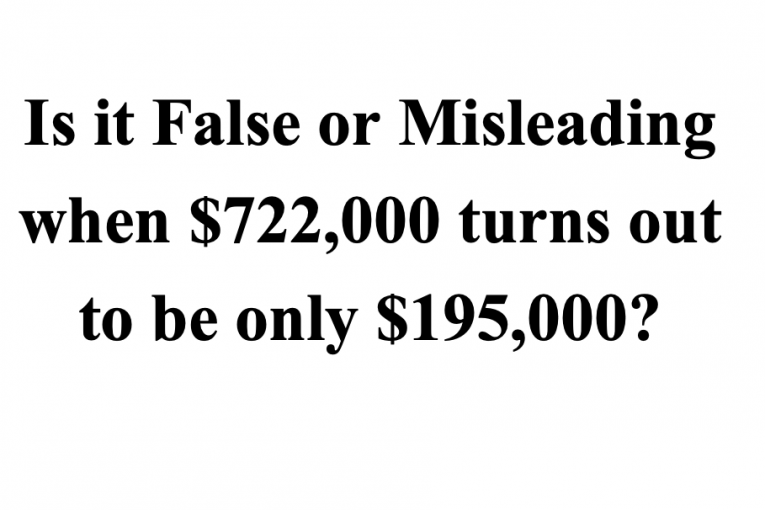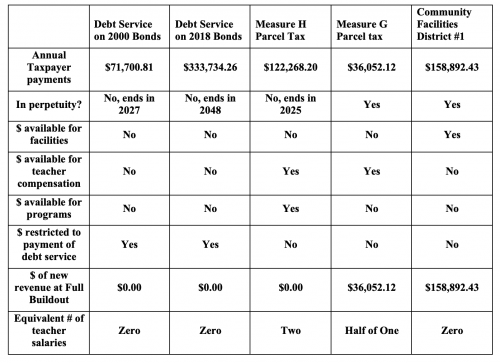
By Matt Williams
Grab your Titanic deck chairs, and we will navigate some icy waters as the campaign communications from the Yes On Measure H team take you over, around and through “false and misleading” assertions about the benefit DJUSD will get from the DiSC project.
Our narrative starts in early March when Amy Haug, whose name is prominently featured on their website as a member of the Yes on H campaign team, contacted the leaders of the various PTA/PTO organizations conveying the following message:
I am not trying to bring this to you in a partisan way, just to bring information. I have already talked to the DHS PTA in the announcements part of their meeting and am scheduled to talk to Emerson, DaVinci and Harper this month. There is some really important things that parents should be aware of on the upcoming ballot measure. Here are just some of the benefits of the DISC for parents specifically:
- The developer has been negotiating with the school district and have agreed to a one-time donation of $2.3 million and a yearly donation of $700,000 every single year thereafter directly to the DJUSD.
To the credit of the leaders of the various DJUSD PTA/PTO organizations, they did some research on Measure H and determined that it does not have direct relevance to the mission and purpose of their respective PTA/PTO. As a result, they unscheduled the pending Yes On H presentations.
Before jumping forward from early March to early April, I ask you to take note of the words “negotiating” and “donation” in that Yes On Measure H message. Both the referenced $2.3 million and $700,000 are legally mandated fees/taxes/levies that all homeowners within the DJUSD boundaries pay each year in their Yolo County Tax Bill. I can not remember when any of those fees/taxes/levies were negotiable for any taxpayer … or could even vaguely be considered to be a “donation” to DJUSD. In fact, whether it was intentional or not, the use of the terms “negotiating” and “donation” is both false and misleading.
With that said, now let’s fast forward to April 6th and the Yes On H presentation by Rick Gonzales and Dan Carson to the assembled members of the Davis Progressive Business exchange. To Rick and Dan’s credit the words “negotiating” and “donation” had disappeared from their presentation materials/handout and been replaced by the term “Impact Fees” together with the statement, “DISC will help generate $722,000 each year in perpetuity, which can cover facilities and programs (equivalent to the salaries of 10 new teachers).”
At the meeting I asked Rick and Dan to provide documentation of how/where the $722,000 was coming from, because there is no reference to it anywhere in either the baseline Features or the development Agreement. When I had not heard anything from either Rick or Dan for over a week, I contacted one of the City staff members I know, and they provided me with the calculations, which add up to $722,717.81. That total is made up of the following five components:
- $71,770.81 to pay the annual debt service on DJUSD’s General Obligation Bonds issued in 2000 after voter approval of a school facilities bond, Measure K on May 23, 2000, which enabled the District to complete basic repairs to education facilities
- $333,734.26 to pay the annual debt service on DJUSD’s General Obligation Bonds issued in 2018 after the voter approval of Measure M “to provide financing for the specific school facilities projects listed below in the Bond Project List”
- $122,268.20 from the Measure H eight year duration Education Programs Parcel Tax approved by the voters on November 8, 2016.
- $36,052.12 from the Measure G perpetual Employee Compensation Parcel Tax approved by the voters on March 3, 2020.
- $158,892.43 from the Facilities District Number 1 (CFD #1) approved by the voters on June 1, 1990 for the purpose of financing new and improved school facilities within the District. Although the bonds for CFD #1 are fully paid, DJUSD is continuing the annual CFD #1 tax assessment in perpetuity.
Armed with that information I created the following table that examines those five components in the context of the Yes On Measure H statement “DiSC will help generate $722,000 each year in perpetuity, which can cover facilities and programs (equivalent to the salaries of 10 new teachers).”

What does the above table tell us? At full buildout DiSC will generate no more than $194,944 a year in perpetuity which can cover facilities and employee compensation, but not programs (equivalent to the salaries of two and a half new teachers). The promise in the Yes on Measure H materials is $722,000 a year … a substantially inflated amount.
That, ladies and gentlemen, along with the aforementioned “donation” gaffe makes the DiSC team’s campaign statements “objectively and verifiably false and misleading”
Just picking out one of these items:
158,892.43 from the Facilities District Number 1 (CFD #1) approved by the voters on June 1, 1990 for the purpose of financing new and improved school facilities within the District. Although the bonds for CFD #1 are fully paid, DJUSD is continuing the annual CFD #1 tax assessment in perpetuity.
How is that legal? (In other words, what gives them the legal authority to continue this in perpetuity? Was this something that was approved by voters, for example?)
Apparently, it was… perhaps hidden in the text, but glossed over because “it’s for the kids”… heard from several sources that it was in the Measure the voter approved, perfectly ‘legal’ (though perhaps not fully ‘ethical’)…
Same problem with the JeRkeD measures… is the electorate fully informed of benefits/consequences? I wonder…
Any other questions? [or even opinion/spiels worded in the form of a question?… I wonder]
Oh, and their are ‘Senior’ exemptions on Measure H, and 50% off on CFD#1 assessments, if you reside in the district… Tax Exemptions – DJUSD
Thanks.
Per the link you provided, owners of “low-income” housing qualify for an exemption from the following CFDs:
What if you assume that Measure H Parcel Tax will be renewed in 2025? That and 2048 isn’t perpetuity but it is a long way away.
Things that the Measure H Parcel Tax can pay for:
Math and reading programs
Elementary science instructionReduced class sizes
Secondary foreign language programs
Music programsLibrariansAthletics and co-curricular
programsSchool counselors, nurses and student support
I guess you could think of pay for facilities that general DJUSD funds that would go these things can now go to facilities. I think further mental and financial gymnastics can be used for funds paying for debt being freeing up money that could go to facilities.
Yeah, the wording and messaging by the YES campaign does seem shady. But I think it can be reasoned out to a degree. It could also go under as: something is better than nothing.
Your article yesterday that criticized the financial payout for the city from DISC….what would you recommend the developer do or provide to make it worthwhile (in your opinion) for the city? Would you create a project cash flow for the city and do a discounted valuation? What would your target IRR for the city’s interest in DISC be?
Things that the Measure H Parcel Tax can pay for:
Uh, huh – for students from Woodland (primarily), since the school district won’t “right-size” willingly.
School districts throughout California are increasingly poaching students from other districts, for the same reason. School enrollment throughout the state is on a death spiral, downward. And few want to acknowledge that – especially if their jobs depend upon it. (Some parents can also be a problem, in regard to closing down unneeded schools.) Don’t look to either of those groups to do what’s best for a community, as a whole.
All good questions Keith.
If Measure H is hypothetically renewed perpetually, the $194,944 goes up to $276,334 … still a long way below the claim of $722,000
Measure H definitely is an Education Programs Parcel Tax, so your list of five items is spot on.
There is a fundamental problem with your guess about paying for facilities. That problem is that the District received (essentially) all of that facilities money back in 2018 when the bonds were issued. The annual tax proceeds are not providing more facilities, they simply are paying the annual debt service on the bonds. So there will be no relief for “general DJUSD funds that would go these things can now go to facilities.”
Further, any additional annual payments that DJUSD receives go into a segregated account that can only be used for the payment of bond debt service costs.
Glad you agree that the wording is shady. Use of the terms “negotiating” and “donation” was more than shady. If we are going to use your sentence “But I think it can be reasoned out to a degree” I would suggest a wording change so it reads “I think it can be weaseled out to a degree.”
Something is better than nothing works only if there are not offsetting incremental costs for the School District.
—————
Regarding your final question I have a two-page detailed document I’ve prepared that addresses your question. I will email it to you. Thanks for asking.
Yes…
BTW ‘seniors’ can vote to renew/increase the taxes (Measure H), knowing they can be exempt from them… classic ‘representation without taxation’… so, since we can be exempt, we’ll just vote for those measures that others (not us) will pay for… it’s the American Way! And, after all, “it’s for the kids”…